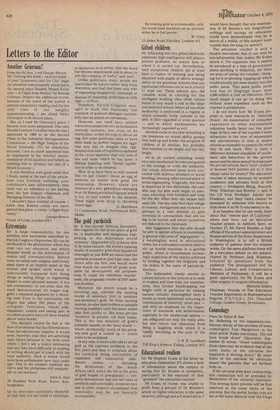The gold yardstick
Sir: It may interest Nicholas Davenport, who regards the fall in the price of gold as "a deplorable and dangerous happening in the depressed world economy" (September 27), to know that if, by some miracle, the world's existing stocks of monetary gold were liquidated overnight at just $100 an ounce and the proceeds invested at just 5 per cent, the return after the first year would more than match the one-for-all profit availiable for development aid purposes even if, under his minimum requirement, the proposed volume of IMF sales was doubled.
Moreover, the return would be a recurring one, whereas the existing stocks of monetary (not to mention non-monetary) gold, far from earning interest, involve their holders in sizeable running expenses until the latter either take their profits or, like some private 'investors' at present, cut their losses. This is the real measure of gold's potential benefit to the 'poor world' — where, incidentally, much of the privately-held gold is locked up — which waits to be mobilised.
In any case, it seems a bit odd to set up gold as the supreme yardstick in the first place and then to complain about the yardstick being susceptible of expansion and contraction alike.
Recent events — including the devaluation of the South African rand, which the fall in the price of gold helped to precipiatate — certainly demonstrate that the two roles of yardstick and commodity, however rare and in other respects exceptional that commodity may be, are basically incompatible. By treating gold as a commodity only, the world need therefore on no account either be or feel poorer.
W. Grey 12 Arden Road, Finchley, London N3.


































 Previous page
Previous page